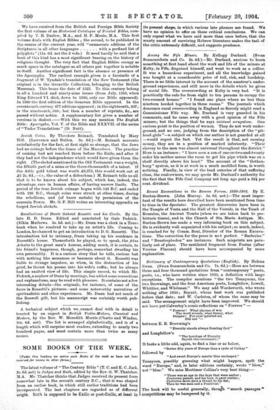Jewish Coins. By Theodore Reinach. Translated by Mary Hill. (Lawrence
and Bullen. 3s. 6d.)—M. Reinach accounts satisfactorily for the fact, at first sight so strange, that the Jews had no coinage before the times of the Maccabees. The practice of coining had not reached them before the Exile, and after it they had not the independence which would have given them the right. (The shekel mentioned in the Old Testament was a weight, the fiftieth part of a mina or the three-thousandth of a talent. If the Attic gold talent was worth £3,375, this would work out at 412s. 6d.,—i.e., the value of a didrachma.) M. Reinach tells us all that is to be known about his subject, which has, indeed, the advantage, rare in human affairs, of having narrow limits. The period of the true Jewish coinage began with 143 B.C. and ended with 186 B.C., though coins were struck at other times, during the rebellions, and (of baser metals) by permission of the suzerain Power. Mr. G. F. Hill writes an interesting appendix on forged Jewish shekels.










































 Previous page
Previous page